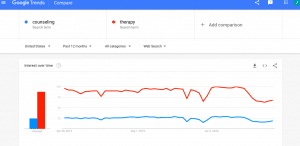The Guide to SEO Strategy for Therapists During Covid-19: Part 1
I’ve heard from many therapists over the last 6 weeks during Covid-19 that they’ve noticed a significant drop off in their new client inquiries. And, the truth is that across the board, my team and I have noticed a dip in organic search traffic for our clients in March and April. Some of our clients started noticing the impact of Covid-19 earlier and some later, but most have been impacted. However, it’s not just limited to our field. One of my favorite sources for news related to SEO, Neil Patel’s site, noted that organic traffic (in other words, website visits from people finding you on search engines) is down in most areas. I’ve certainly seen that looking at my own client’s data.
So…why isn’t the phone ringing?

Fewer people seem to be looking for mental health services.
Perhaps you’ve always had great SEO but have noticed the calls have dropped the past month. What’s up? Like this article says, we’ve noticed that Covid-19 is having a huge impact on search interest. You can see from the Google Trends graph above that in the United States searches for the terms “counseling” and “therapy” have actually dropped below the level of searches we see even during our most challenging “normal” weeks of the year. In other words, fewer people are searching for our services right now than do even the week of Christmas. The silver lining here is that as a country, searches do seem to be on a slight trend back upward, so people may be starting to search for mental health services again. As I’ve looked at individual states for my clients, I’ve certainly seen more of an upward trend in some parts of the country compared to others this week.
My theory is that people are still in shock
In that moment of shock, people are essentially in survival mode. There’s been a picture circulating on Facebook (I won’t share it here b/c I don’t have permission) with physiological needs and safety needs circled that says, “People are here.” And I think that’s accurate. People are worried about their own safety. They’re worried for their loved ones. There are concerns about job losses and how bills will be paid.
Right now, those things are outweighing mental health needs in the minds of many, so people aren’t able to put too much focus (yet) on psychological needs.
BUT this pandemic clearly has an impact on psychological needs. Eventually, things level off, people move out of a state of shock and feel like their immediate basic needs are met. At that point, I imagine we’ll see people looking for our services in very large numbers.
So…what do we do about SEO right now?
SEO is a Long Term Marketing Strategy
First of all, I think SEO is more critical than ever for a few reasons, because SEO is a long term marketing strategy. It’s not like pay per click advertising where the money you sink in right now won’t do much for you in the future. Rather, focusing on improving your search engine rankings right NOW will help you rank well for months, or likely, years to come. SEO takes time. Focusing on SEO now will set you up to be found by potential clients a few months from now.
Thinking Ahead
Essentially, focusing on SEO right now is looking ahead to the future.
Waiting to “Return to Normal” Versus Adapting
Now, when I talk about SEO as a long term strategy, I’m afraid you’ll think that means it’s a matter of just waiting until people’s behavior “returns to normal.” But the truth is, I think it’s more about adapting. None of us has a magic ball to predict the future. But I think we can look at the impact we’re seeing right now (and check in frequently to see if data is changing) and then do our best to try to anticipate how Covid-19 will impact our clients for years to come.
How to Begin Adapting Your SEO Strategy Right Now
 To be honest, I’ve waited so many weeks to write this blog, because I have been watching my own data and my clients’ data like a hawk. Google Trends has become my new best friend, which I’ll explain more below. And, I’ve been scouring the internet for information about the changes in SEO strategy while evaluating the source of everything I read. I wanted to make sure that the information I shared with you was high quality. But the truth is that week by week I’m changing my strategy with my own clients. My team and I are trying different things, talking to our clients and tweaking our strategy bit by bit.
To be honest, I’ve waited so many weeks to write this blog, because I have been watching my own data and my clients’ data like a hawk. Google Trends has become my new best friend, which I’ll explain more below. And, I’ve been scouring the internet for information about the changes in SEO strategy while evaluating the source of everything I read. I wanted to make sure that the information I shared with you was high quality. But the truth is that week by week I’m changing my strategy with my own clients. My team and I are trying different things, talking to our clients and tweaking our strategy bit by bit.
And I think that’s how it’s going to be right now. I certainly don’t want to scare you away from trying SEO right now. The opposite actually. I want to encourage you to get on your site and start making changes NOW that will set your website up long term. But I do want to be honest with you that this is the best advice I can give you right at this moment. And most likely, next week on the closed Facebook group for my SEO clients I’ll be sharing a new tweak or change based on what I keep learning. So, work hard now but please don’t hold it against me if I’m giving different advice a month from now.
My Approach to SEO for Therapists Right Now
Post Truly Useful Content Related to Mental Health & Covid-19
If you’ve been following me recently, you know I’ve been a big advocate from day one that we as mental health professionals need to have a voice right now. I’ve pointed out that publishing useful content on your website about Covid-19 and mental health will help your ideal clients cope right now and have the added benefit of helping with your SEO.
Will I sound like a salesperson?
I heard someone express concern today that maybe they’ll come across as sleazy. However, I disagree. I mean, you absolutely could come across that way. But I don’t think most therapists will. The key is to write content that you truly believe will help your ideal client. It should come from a genuine desire to help and to share the knowledge you have with people who are struggling during covid-19. Because that’s the thing: people are struggling with anxiety, depression, relationship problems, feelings of isolation and trauma triggers right now. If we are speaking to those pains and offering truly helpful tips, how is that a bad thing?
Of course, if you write a blog post with the pure motivation of exploiting the virus it will come across that way. But I believe in you folx. I’ve seen the blog posts you all have written in the past. I’ve heard you talk about your clients. You CARE. So let that come across in your website copy. Show that you understand your clients’ pain. And also, show them that they don’t have to suffer alone.
That’s why you need to invest more time in the content component of the SEO….people need the information you have.
Another post I read earlier this week talking about SEO recommended that businesses “Focus on a message of comfort and hope….Now, in a time of crisis, you want to move your content efforts toward educational content that establishes trust.” I agree 100%. We can be providing education about mental health and about the impact we believe this crisis will have on our clients. We can offer comfort and hope. As a mental health provider, that is your specialty. So, don’t hesitate to stand up and add content to your website talking about this whether it’s a new service page for a crisis focused service you want to offer, a small blurb on your FAQ or online therapy page or a series of blog posts.
Will Google get mad at me for talking about Covid-19?
I heard this theory as well today. And I suppose I can’t say 100% that it won’t because I don’t own Google’s algorithm. Obviously, if they think you are trying to exploit the virus, that would be a “no no” for Google. But if you see my advice above, you’ll notice I’m not too worried about you doing that. Your website is about mental health. So, if you are writing a blog post about mental health and the coronavirus, Google will be able to see that the content is related to your site and legit, meaningful content. In fact, yet another article about SEO during Covid 19 gave the advice that pretty much every business should have a page on its site related to the coronavirus.
Now, I will add one word of caution here. You don’t want to “keyword stuff.” An example of keyword stuffing would be if I put the phrase “Covid-19” ALL over this page. If it was mentioned in pretty much every sentence, Google would see that clearly I was trying to rank well for that term and might actually be less likely to rank me for it. So…mention the pandemic, the virus and talk about the impact, but don’t try to fit that keyword in 5,000 times. Honestly, I see more therapists use keywords too infrequently than too often.
Secure Your Website
A couple years ago, Google acknowledged that it gives preferential treatment to websites that are “secure.” This is always something you should do (again, google prefers it), but it seems especially important right now as I’ve read there may be an increase in people trying to hack your website. Whether or not that’s true, it’s a pretty easy fix so I think everyone should look into doing this.
There’s an easy way to tell if your website is secure. Just check to see if it begins with, “Https://”. If the “s” is missing, your site is not secure. The good news is that it’s pretty easy to fix. It’s different for different platforms, so I won’t get into specifics here. However, if you Google “how to add a security certificate to a (Wix/Wordpress/SquareSpace) website” you should find some step by step instructions. Or, better yet, you can e-mail your website developer if you have one.
To learn more, check out this post.
 Keep Up to Date with Keyword Research
Keep Up to Date with Keyword Research
The truth is that covid-19 IS having an impact on the words people are searching for. So, it may be time to tweak the keywords you are targeting. For instance, I’ve spent two years advising therapists not to target the keyword Telehealth, because nobody was searching for it. Guess what? There has been a HUGE spike in people searching for Telehealth the last couple of months. Now, you might still not want to target Telehealth as it’s a pretty general term. In fact, many people using that search term might be looking for a primary care physician to get a COVID-19 test instead of mental health services. However, my point is to be purposeful in choosing which keywords you are targeting. Keep in mind that the keywords you target today may be different than the keywords you were targeting a few months ago.
More Information About SEO During COVID 19
Use these tips to start pivoting your own SEO strategy right away. Then, check out Part 2 of this Comprehensive Guide to SEO during Covid 19 where I have SIX more strategies coming up on Wednesday, so stay tuned!
Want more SEO tips right away?
First of all, make sure you’ve checked out the second half of this SEO during the Coronavirus guide. Then, remember, you can always go through our online SEO courses to learn very specific things you can do to work on your SEO on your own!
Not sure what the next step is?
I believe therapists can learn SEO. I also believe not every therapist wants to or that it’s really the best use of their time. If you’re just not sure what will get you the best return on investment right now, go ahead and schedule a free Zoom consultation with us and we’ll take a look at your site together and figure out what will help you the most!
Book a Consult to Learn About our Services





Leave a Reply
Want to join the discussion?Feel free to contribute!